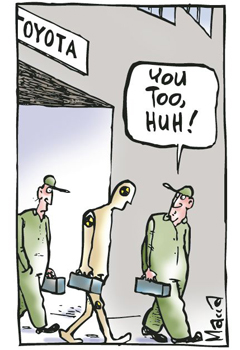There is no doubt that the automotive industry plays an important role in the Australian economy - but there is also no doubt that the Gillard Government's recent attempts to support it are like providing Panadol to a heart attack victim. It might make them feel a little less pain but it will do nothing to cure what's killing them.
The mining boom and the record exchange rates that accompany it are responsible for the pain that companies like Toyota are feeling. When one Australian dollar bought 70 US cents, people wondered whether we could have a competitive car industry. But with the Australian dollar close to parity with the greenback, the collapse of the industry is becoming inevitable.
It gets worse. Every time you hear plans for a new multi-billion-dollar gas deal in Western Australia or a massive new coal mine in Queensland, you just heard the sound of the Australian dollar rising further.
No matter how they try and spin it, no minister can deny that big mining projects push our dollar higher and, therefore, more of our manufacturing jobs offshore.
The problem is that we are having a phoney debate about providing assistance to the car industry. The real debate is about whether we want to allow the expansion of mining to keep cannibalising manufacturing, tourism and education.
When the expansion of one industry causes pain for another industry, economists call the process "crowding out''. Unfortunately for manufacturing workers in Victoria, most economists have decided that it is OK if the mining boom comes at the expense of manufacturing.
Mining jobs, we are told, are simply more productive. Unfortunately for many workers, however, losing a job in Victorian manufacturing doesn't guarantee you a mining job in WA, even if you wanted to move away from friends and family.
But you're unlikely to hear our elected representatives admit that what is good for mining is bad for manufacturing. That's why the Government continues to hand out vast amounts of money to assist the car industry.
They don't want to appear to be doing nothing, yet they know full well that with the mining industry booming and the dollar surging, this "assistance'', in the form of taxpayer "support'', is just not going to be enough. The car industry has always played an important role in Australian economics and politics.
The ability to manufacture cars is crucial to both the perception and the reality of the sophistication of the Australian economy. The car industry creates jobs in other industries while providing highly visible proof that Australia can still "make things''.
 The rising dollar has seen a wide range of Australian icons move offshore, including Bonds textiles and a growing proportion of our food processing. But as long as we still have a car industry we can, it seems, convince ourselves that manufacturing will be OK. No politician wants to oversee the closure of a car factory.
The rising dollar has seen a wide range of Australian icons move offshore, including Bonds textiles and a growing proportion of our food processing. But as long as we still have a car industry we can, it seems, convince ourselves that manufacturing will be OK. No politician wants to oversee the closure of a car factory.
The political problem for the car industry, however, is that a growing number of politicians have hitched their vision for Australia's future to the mining industry's wagon. While the car industry is still a big employer, it seems that more backbenchers are worried about incurring the wrath of the miners than they are of the manufacturers.
Approval for more LNG, coal seam gas and enormous coal mines might create a few more jobs in Australia's north, but they will decimate what's left of manufacturing in Australia's south. Modern Australia has always had a car industry, and we can keep one if we so choose.
Both major parties rightly support ongoing assistance for the car industry, but its future will not be determined by political squabbling over the size and composition of such support.
Rather, the future of the car industry will be determined by what restrictions, if any, we put on the expansion of the mining industry. A bigger mining boom means a bigger manufacturing bust. The problem is that while both major parties are squabbling over the amount of assistance the car industry needs, both parties are happy to sit back and let the mining boom rip.
Dr Richard Denniss is executive director of The Australia Institute, a Canberra-based think tank.


.jpg)


.jpg)











Comments